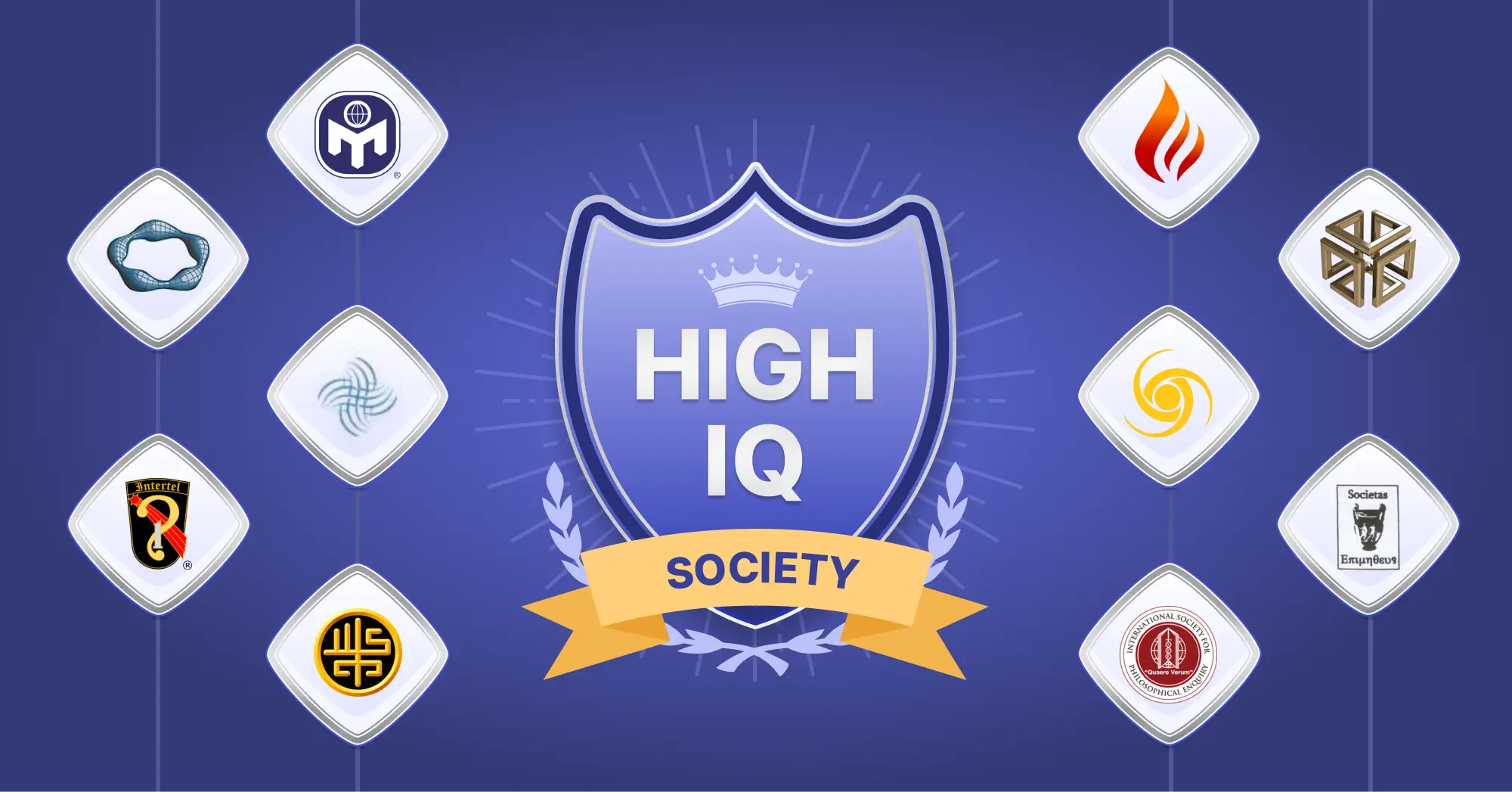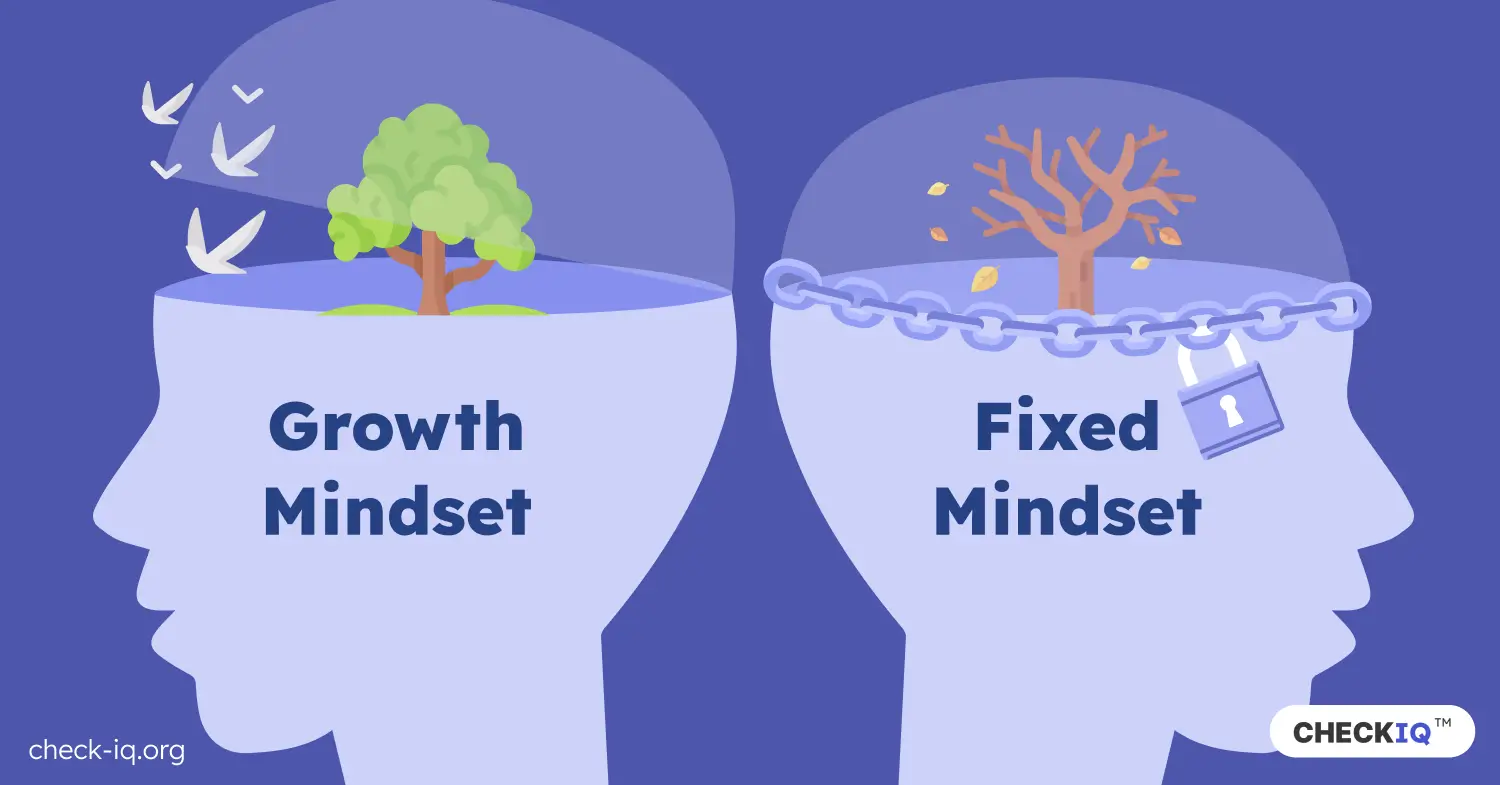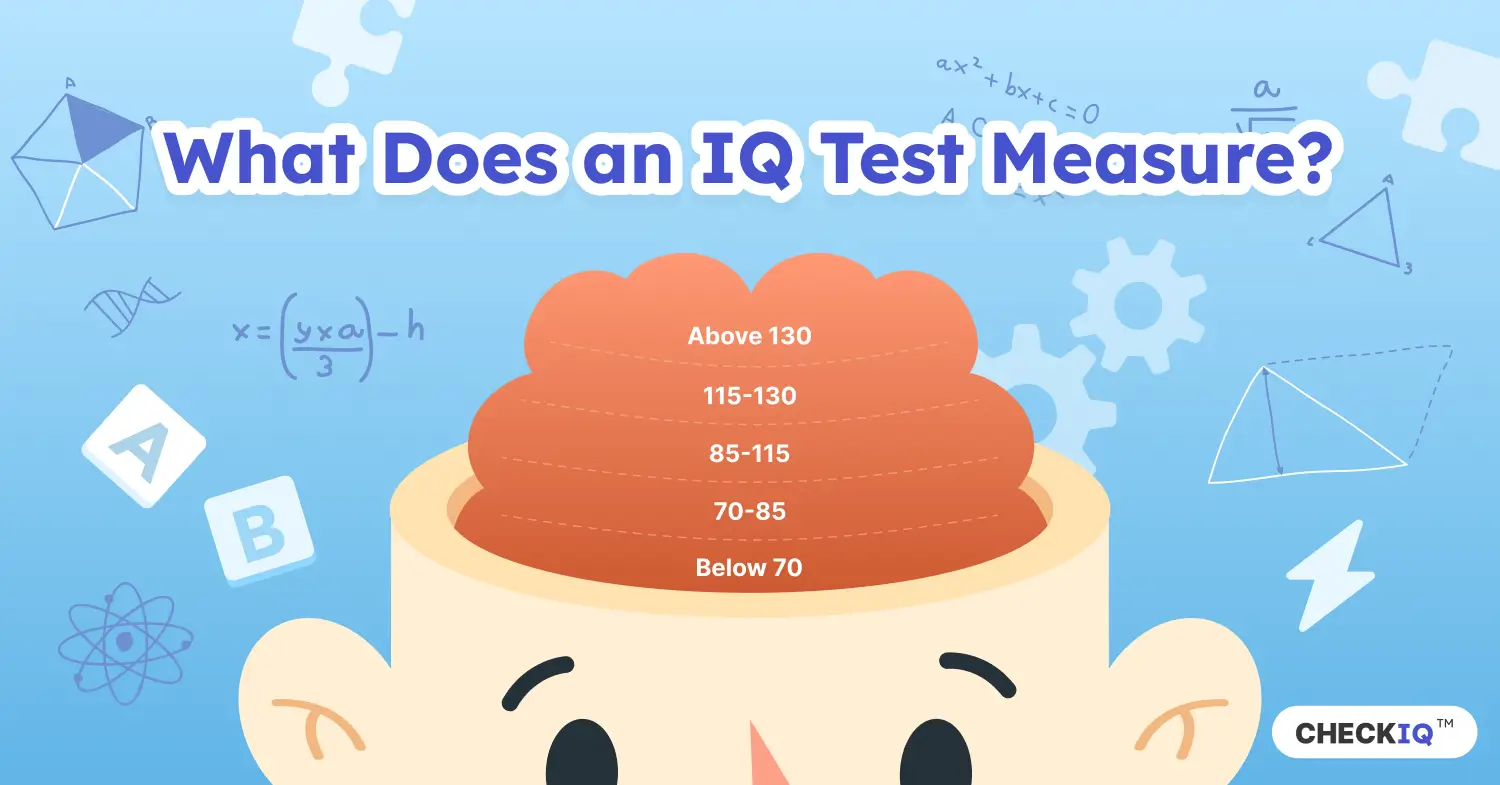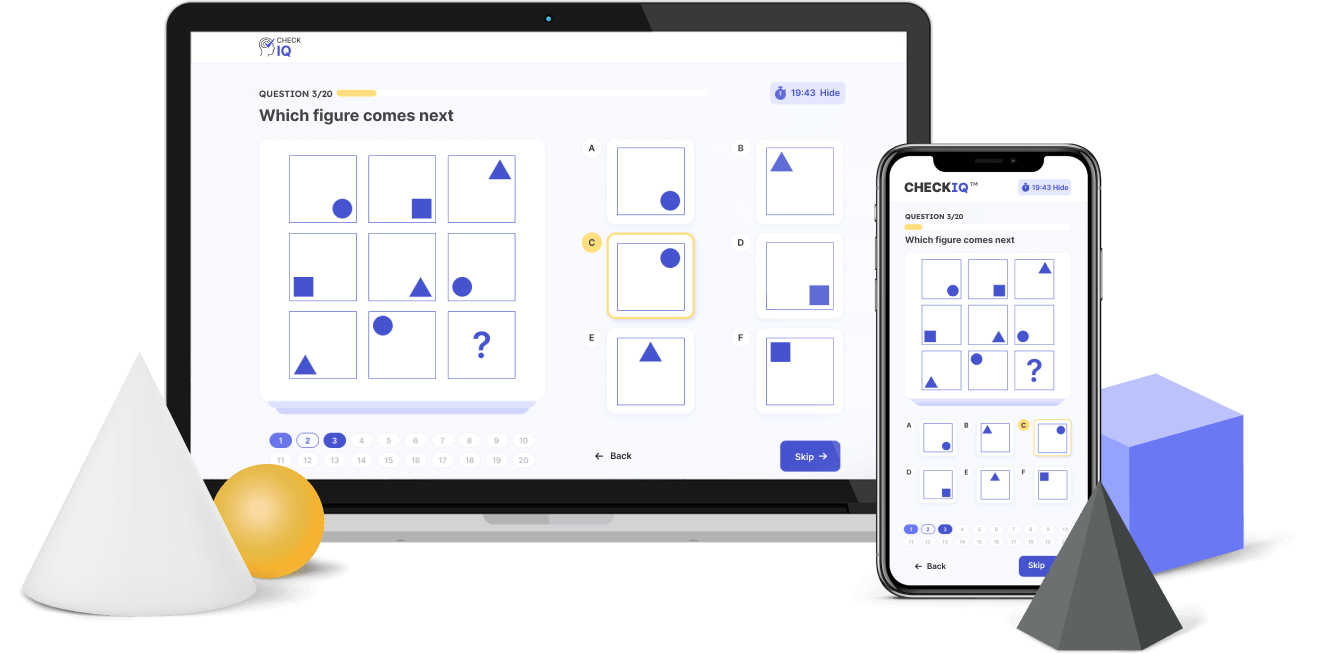The brightest minds in the world have created exclusive societies for themselves - but what is their purpose?
While it may seem like these organizations are shrouded in mystery, this is generally untrue. Most of them, such as Mensa International or Intertel, have transparent eligibility criteria and objectives, all of which you can find on their official websites.
Let’s navigate the less-advertised world of high-IQ societies together and see what they aim to achieve:
High-IQ Societies Explained
Purpose
Simply put, a high-IQ society is an organization that brings together individuals with significantly higher than average IQ scores.
These exclusive groups, including the renowned Mensa and the even more selective Mega Society, form a network of people who share a common trait of remarkable cognitive abilities measured through standardized IQ tests.
However, the purpose of these societies goes beyond gathering smart people. They aim to provide a stimulating intellectual and social environment where members can exchange ideas, participate in activities that challenge their minds, and contribute to scholarly discussions.
What explains the fascination with high-IQ
Many people see IQ scores as a reliable measure of someone's brainpower. This fascination comes from our natural curiosity about what makes certain people excel in thinking and problem-solving.
High IQ is often linked to the ability to solve tough problems and grasp complex ideas quickly. For example, imagine someone who can easily understand advanced mathematics or learn a new language in a few weeks. This kind of ability makes us wonder what makes these individuals different.
High-IQ societies like Mensa International add to this intrigue. These groups bring together people who often feel out of place because their cognitive abilities are so far above average. In Mensa, they find others who think like they do, creating a sense of belonging and understanding that they might not get elsewhere.
This combination of admiration for intellectual skills and the need for community helps explain why so many are captivated by high IQ. It speaks to our desire to understand human potential and find our place among those who share similar talents.
A reliable 100% adaptive online IQ Test. Get your IQ score immediately.
Start My IQ Test
Does a high IQ make you a genius?
Now, when you think about genius, you might automatically think about those with high scores on standardized IQ tests. However, scoring incredibly well on an IQ test doesn't necessarily equate to being a genius – at least not in the broad sense of the word.
Geniuses are usually people who have made significant, original contributions to their field, which isn't something an IQ test can gauge. IQ tests are adept at measuring certain cognitive abilities, including logic, pattern recognition, and problem-solving – which, while components of genius, do not encompass it entirely.
Scale scores from these tests offer a snapshot of one's potential in specific intellectual domains but can't account for creativity, persistence, or the myriad other factors that contribute to groundbreaking achievements.
As Susanne Schregel's research discusses, groups like British Mensa have long promoted the importance of intelligence and its assessment, though this advocacy has not been without controversy and criticism. It raises important questions about the role of IQ in society and how it shapes our understanding of intelligence and genius.
List of High-IQ Societies
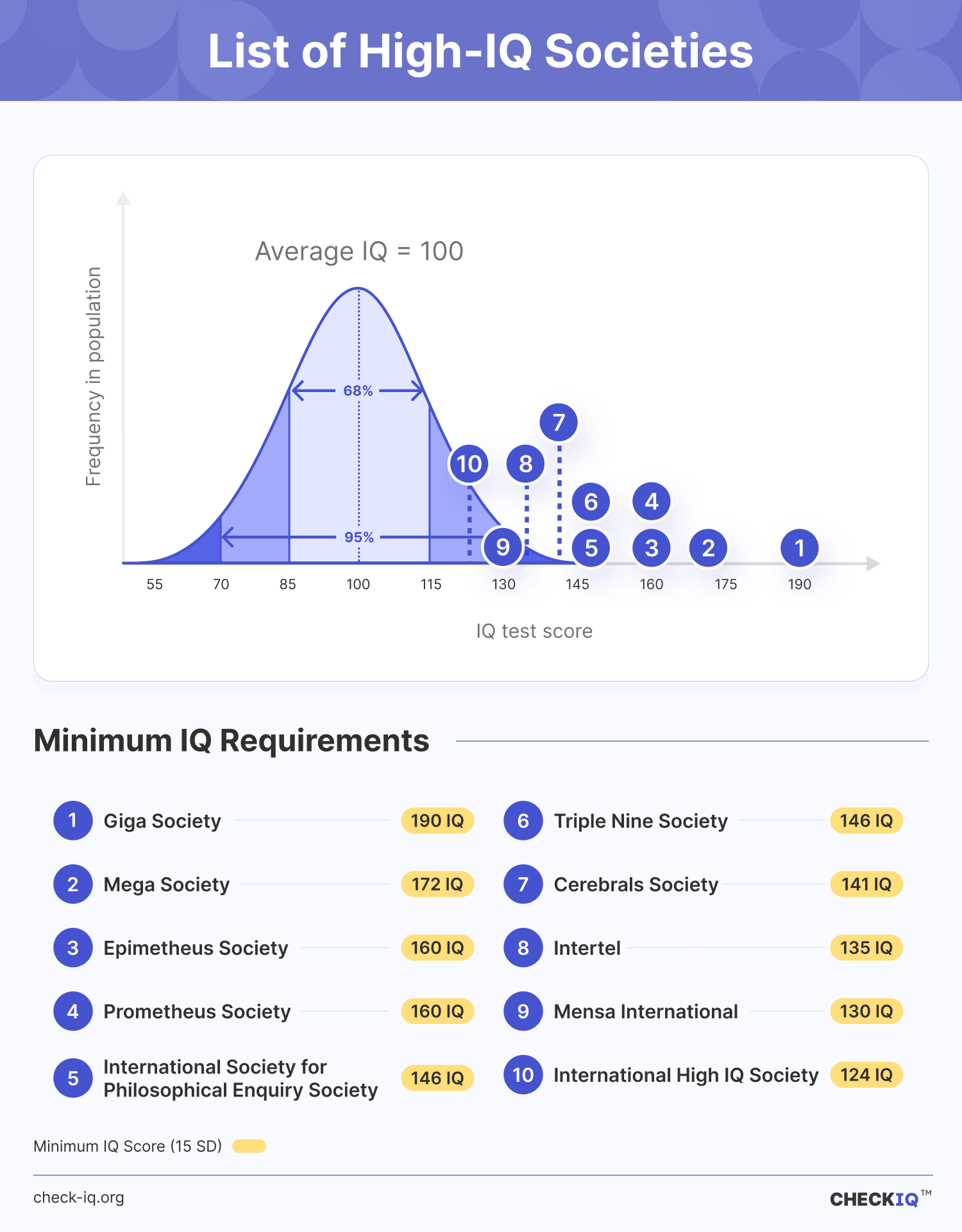
High-IQ societies are exclusive clubs that put a premium on high intelligence, and they’re known for accepting those who rank in the top 2% based on standardized IQ tests.
From young prodigies to seasoned thinkers, Mensa's membership is as diverse as it is brilliant. Beyond Mensa, there are other notable societies like the Triple Nine Society, requiring an even more exclusive threshold of the top 0.1%, and the Prometheus Society, catering to the ultra-intellectual.
But the landscape of high-IQ societies is vast and varied, including organizations like:
- Epimetheus Society
- Omega Society
- Cerebrals Society
- Giga Society
- Pi Society
- Tetra Society
- Olympiq Society
- Pars Society
These groups cater to a wide range of intellectual interests and levels of exclusivity, from those requiring scores in the upper echelons of the IQ spectrum to those focused on specific areas of intellectual or creative achievement.
| Rank (lowest to highest admission difficulty) | High-IQ Society | IQ Range Required | Minimum IQ Score |
|---|---|---|---|
| 10 | International High IQ Society | Top 5% | 124 |
| 9 | Mensa International | Top 2% | 130 |
| 8 | Intertel | Top 1% | 135 |
| 7 | Cerebrals Society | Top 0.3% | 141 |
| 6 | Triple Nine Society | Top 0.1% | 146 |
| 5 | International Society for Philosophical Enquiry | Top 0.1% | 146 |
| 4 | Prometheus Society | Top 0.003% | 160 |
| 3 | Epimetheus Society | Top 0.003% | 160 |
| 2 | Mega Society | Top 0.0001% | 172 |
| 1 | Giga Society | Top 0.000000001% | 190 |
Let’s go through the above list of high-IQ societies.
International High IQ Society
Overview of International High IQ Society
Launched in 2000 by Nathan Haselbauer as the New York high-IQ society, the International High IQ Society (IHIQS) quickly grew to encompass a global community, embracing a wide spectrum of intellectual minds. IHIQS seeks out the top 5% of the population in terms of IQ, inviting a rich diversity of adults from different cultures and professions to engage in deep, meaningful conversations on a variety of subjects.
Becoming a member of IHIQS means joining a modern intellectual movement, where exchanging ideas and the excitement of learning are celebrated. With groups in English, Dutch, German, Italian, and Japanese, the society offers a platform for dynamic discussions among its members, aged 15 and up, who meet the top five percent IQ criteria.
Entry into IHIQS involves taking a Culture Fair Intelligence Test online, with a small fee, to ensure a standardized and equitable process for all applicants. The society upholds strict admission standards, recognizing only tests administered under professional supervision.
This approach not only underscores the members' intellectual achievements, but also opens the door to a worldwide community eager for collective intellectual advancement and personal growth.
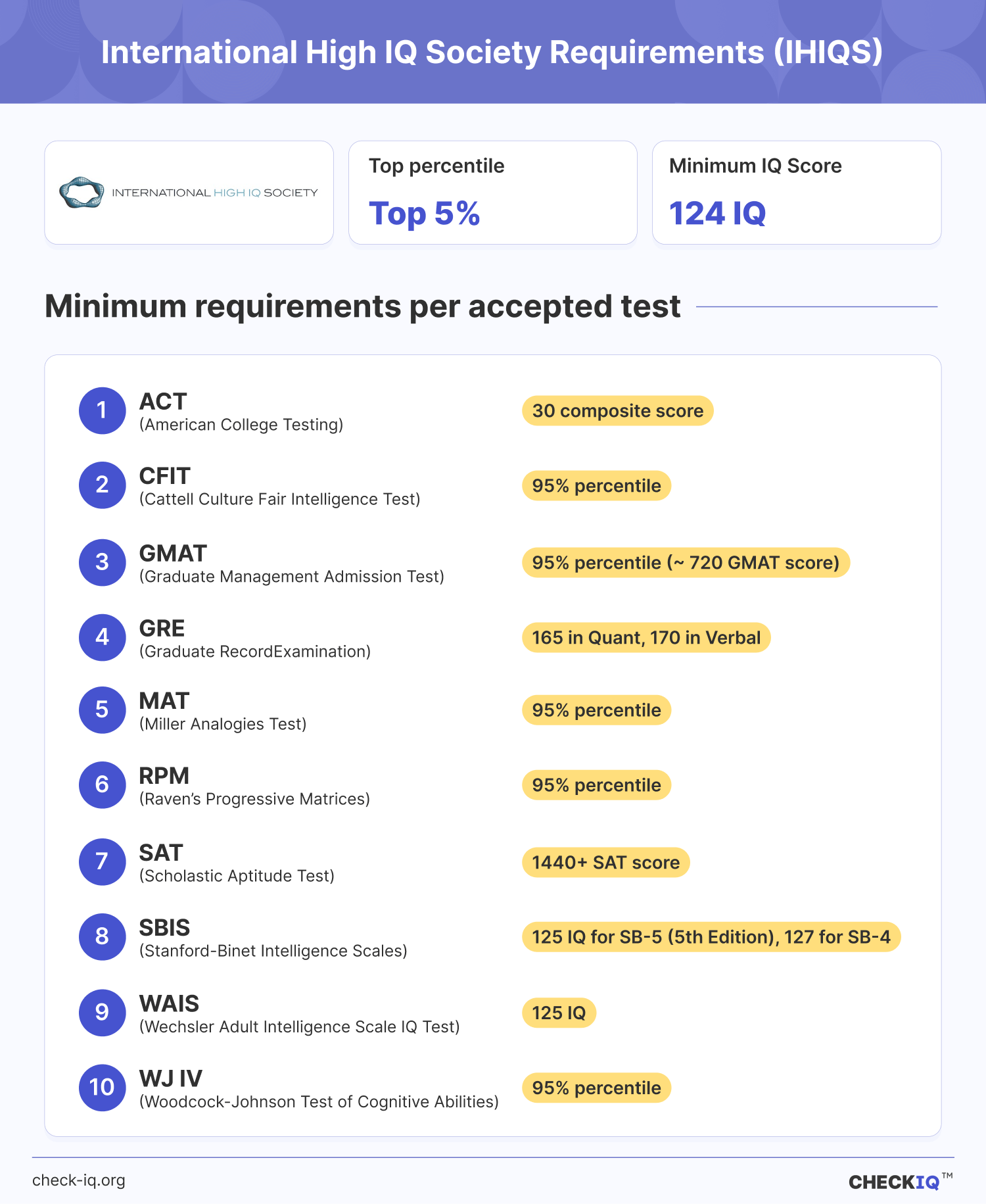
International High IQ Society requirements (IHIQS)
This is probably one of the least selective “high-IQ” societies. To get in, you’ll need to score a 124 IQ which puts you in the top 5% of all IQ test takers. For example, it takes at least a 710 GMAT score to be in the 95th percentile.
| Test | Minimum Score |
|---|---|
| ACT (American College Testing) | 95th percentile |
| Cattell Culture Fair Intelligence Test | 95th percentile |
| GMAT (Graduate Management Admission Test) | 95th percentile |
| GRE (Graduate Record Examination) | 95th percentile |
| Miller Analogies Test | 95th percentile |
| Raven’s Progressive Matrices | 95th percentile |
| SAT (Scholastic Aptitude Test) | 95th percentile |
| Stanford-Binet Intelligence Scales | 95th percentile |
| Wechsler Adult Intelligence Scale IQ Test | 95th percentile |
| Woodcock-Johnson Test of Cognitive Abilities | 95th percentile |
In addition, memberships at Mensa, Triple Nine Society, International Society of Philosophical Enquiry and Intertel can get you in the International High IQ Society.
Mensa International
Overview of Mensa International
Mensa International is not your average brainiac club! Founded in 1946 by two strangers on a train, Mensa has become the intellectual elite's playground. Dubbed the "Rolex of high-IQ societies", it's where the top 2% in IQ tests (that's an average IQ of 131) find their tribe across 150,000 members in 100 countries. Among its notable members are celebrities like entrepreneur and motivational speaker Tai Lopez; actor Nolan Gould, known for his role in "Modern Family"; TV presenter and sports anchor Erik Kuselias; antivirus software pioneer John McAfee; controversial TV personality Jimmy Savile; TV presenter and author Carol Vorderman; and Marilyn vos Savant, who is known as one of the smartest people alive.
But Mensa is more than just number-crunching geniuses. It's a vibrant community diving into everything from biochemistry to witchcraft in its Special Interest Groups (SIGs). Think of it as the ultimate intellectual buffet with a side of societal improvement.
Members benefit from the Mensa Research Journal, scholarships, and volunteer gigs which contribute to a smarter, better world. Plus, with lively events and an online hub, Mensa makes sure its members are never just solitary thinkers.
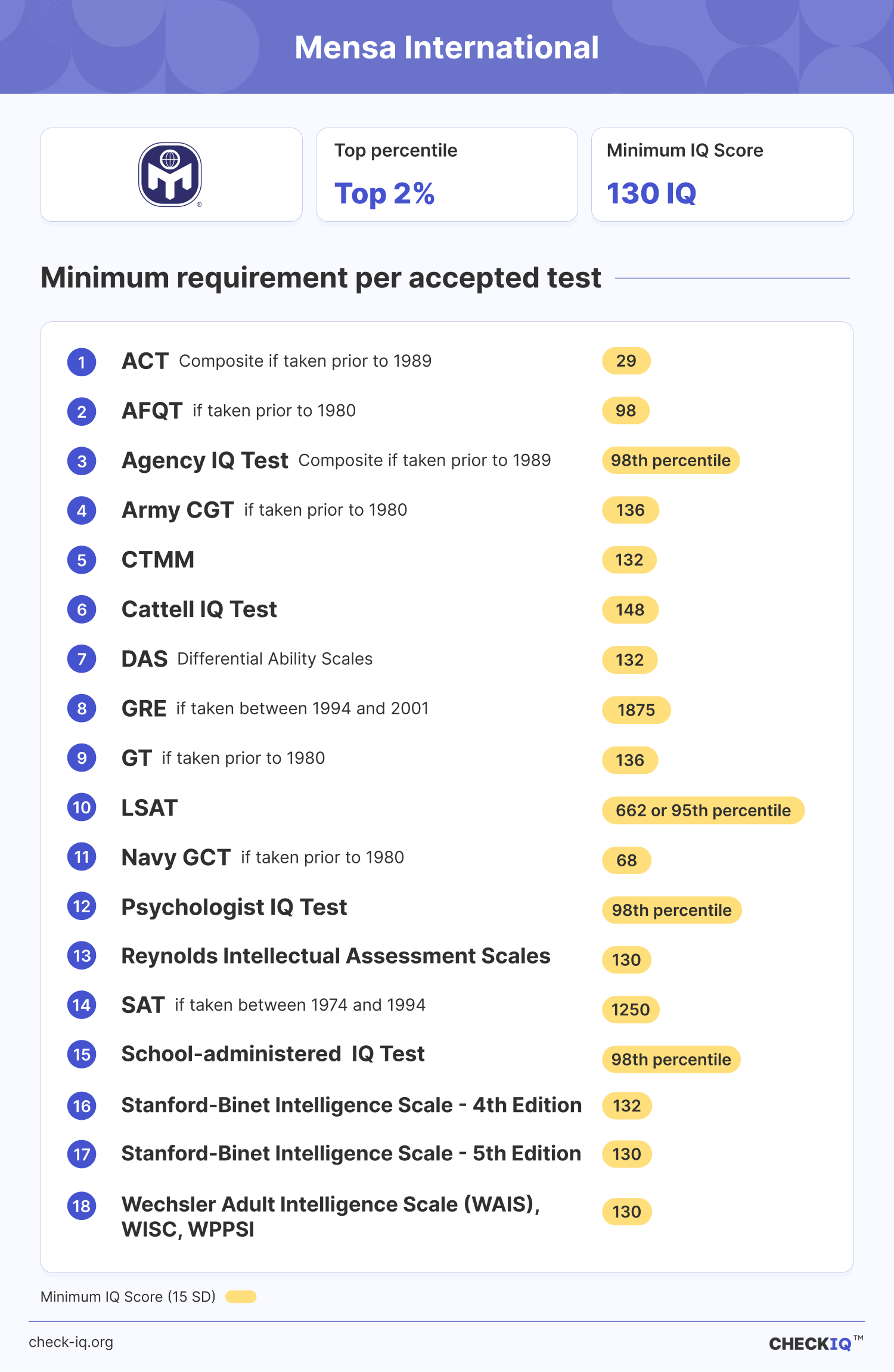
How to be accepted into Mensa International?
In order to get accepted into Mensa, you’ll need to get an IQ score of at least 130, using Wechsler IQ Test (WAIS, WISC), and 132 using the Stanford-Binet Test. Mensa members are in the top 2% of IQ test takers, with an average IQ of 131.
Mensa accepted tests
On top of its own Mensa IQ test, Mensa accepts different types of IQ tests and a range of standardized tests. For example, ACT, AFQT, Agency IQ Test, Army CGT, California Test of Mental Maturity (CTMM), Cattell IQ Test, Differential Ability Scales (DAS), GRE, GT, LSAT, Navy GCT, Psychologist IQ Test, Reynolds Intellectual Assessment Scales, SAT, School-administered IQ Test, Stanford-Binet IQ Test, and Wechsler IQ Test (WAIS, WISC).
Mensa eligibility requirements per test
| Test | Minimum Score |
|---|---|
| ACT Composite if taken prior to 1989 | 29 if taken prior to 1989 |
| AFQT if taken prior to 1980 | 98 |
| Agency IQ Test | 98th percentile |
| Army CGT if taken prior to 1980 | 136 |
| California Test of Mental Maturity (CTMM) | 132 |
| Cattell IQ Test | 148 |
| Differential Ability Scales (DAS) | 132 |
| GRE if taken between 1994 and 2001 | 1875 |
| GT if taken prior to 1980 | 136 |
| LSAT if taken prior to 1982 | 662 |
| LSAT if taken after 1982 | 95th percentile |
| Navy GCT if taken prior to 1980 | 68 |
| Psychologist IQ Test | 98th percentile |
| Reynolds Intellectual Assessment Scales | 130 |
| SAT if taken between 1974 and 1994 | 1250 |
| School-administered IQ Test | 98th percentile |
| Stanford-Binet IQ Test (4th Edition) | 132 |
| Stanford-Binet IQ Test (5th Edition) | 130 |
| Wechsler IQ Test (WAIS, WISC) | 130 |
Intertel
Overview of Intertel
Founded in 1966, Intertel brings together the top 1% of IQ scorers worldwide, creating a unique blend of intellectual fellowship across 1,500 members in 40 countries.
This society isn't just about high IQ scores; it's a platform for diverse ideas, research on intelligence, and annual intellectual gatherings, like the upcoming event in North Carolina. Despite its global reach, most of its membership resides in the US, offering a mostly American perspective.
Intertel's publications, from the journal Integra to regional newsletters, showcase a wide array of content, including thoughtful poetry and speculative essays on intelligence. Intertel aims to be a serious, globally-minded community for those passionate about intellectual exploration and connection.
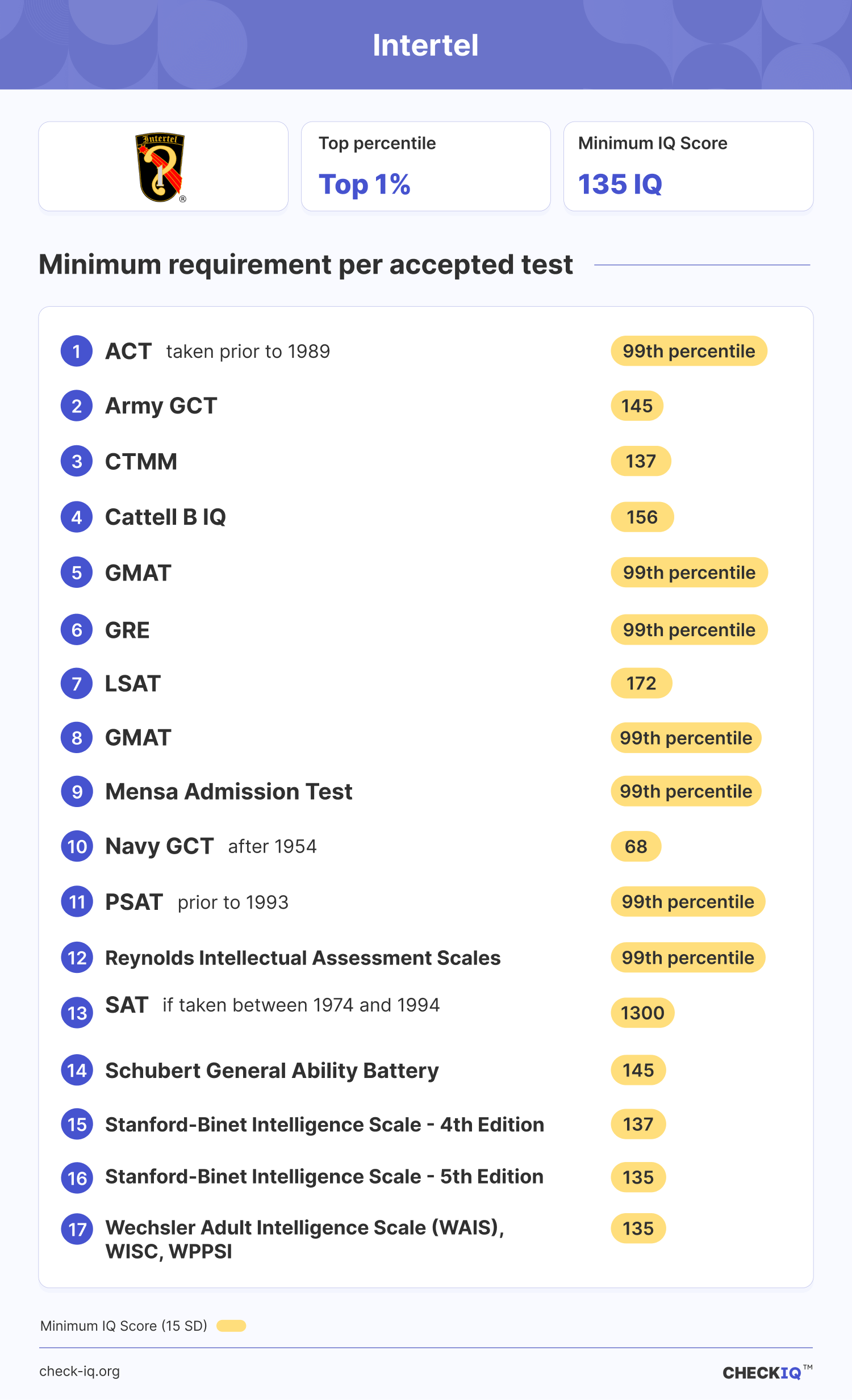
Intertel Eligibility requirements
Intertel Society members are in the top 1% of IQ test takers, with an average IQ of 135 (σ=15).
Like Mensa, Intertel accepts several types of IQ tests and standardized tests. Accepted tests include ACT, Army GCT, California Test of Mental Maturity (CTMM), Cattell B IQ, GMAT, GRE, LSAT, Mensa Admission Test, Navy GCT, PSAT, Reynolds Intellectual Assessment Scales, SAT, Schubert General Ability Battery, Stanford-Binet IQ Test, and Wechsler IQ Test (WISC, WAIS, WPPSI).
| Test | Minimum Score |
|---|---|
| ACT score if taken prior to 1989 | 99th percentile |
| Army GCT | 145 |
| California Test of Mental Maturity (CTMM) | 137 |
| Cattell B IQ | 156 |
| GMAT | 99th percentile |
| GRE | 99th percentile verbal or quantitative |
| LSAT | 172 |
| Mensa Admission Test | 99th percentile |
| Navy GCT after 1954 | 68 |
| PSAT prior to 1993 | 99th percentile |
| Reynolds Intellectual Assessment Scales | 99th percentile |
| SAT if taken between 1974 and 1994 | 1300 |
| Schubert General Ability Battery | 145 |
| Stanford-Binet IQ Test | 135 |
| Wechsler IQ Test (WISC, WAIS, WPPSI) | 135 |
Cerebrals Society
Overview of Cerebrals Society
The Cerebrals Society, kicked off in December 1999 by Xavier Jouve, stands out as a global club for the brainiest, targeting those with IQs in the top 0.3%. This makes it more selective than Mensa, offering a unique spot for the intellectually elite, with free-for-life memberships.
The society attracts a growing number of members, showcasing a mix from Europe and beyond, all sharing high IQs of at least 141, for IQ tests with a standard deviation of 15 – 144 IQ if using a standard deviation of 16.
Founded to bring together sharp minds and ease the loneliness that can come with being super intelligent, Cerebrals has sparked connections through brainy competitions and various projects.
Despite some hiccups in running the show and keeping members engaged, the society's core mission, inspired by Jouve's groundbreaking work in intelligence research, remains strong, aiming to enrich minds and bridge distances among its members.
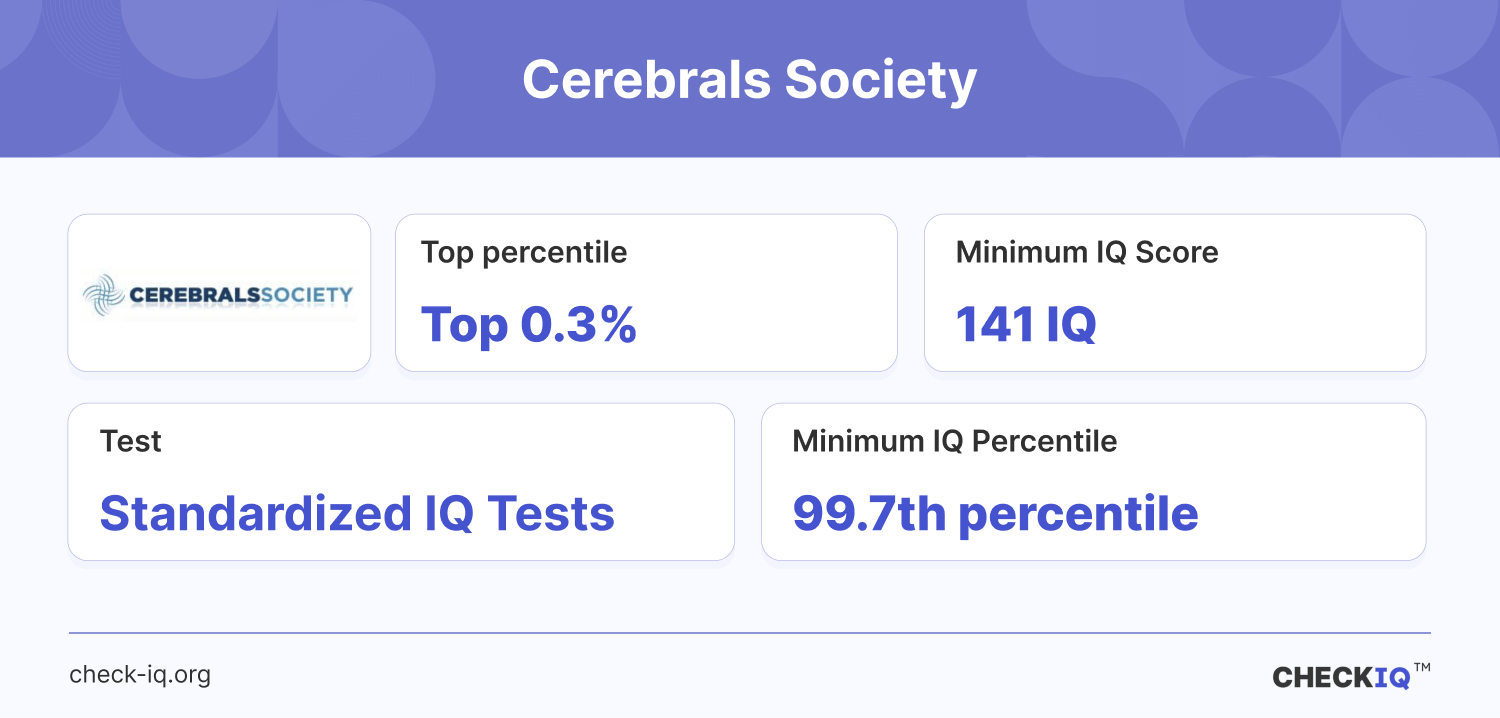
Cerebrals requirements
Cerebrals Society members are in the top 0.3% of IQ test takers, with an average IQ of 141, with standard deviation of 15, or 144, with standard deviation of 16.
Accepted tests include standardized IQ tests with a score of 141 or 99.7th percentile.
| Test | Minimum Score |
|---|---|
| Standardized IQ Tests | 141 or 99.7th percentile |
Triple Nine Society
Overview of Triple Nine Society
Established in 1978, the Triple Nine Society (TNS) is an elite community for those within the top 0.1% of the population, requiring a minimum IQ of 146. This makes TNS much more selective than Mensa, boasting around 1,900 members in 46 countries.
TNS is dedicated to intellectual exploration and personal development, upholding values of democracy, diversity, and innovation. Its members enjoy access to "Vidya," its journal, along with online forums, annual meetings, and global events.
Interestingly, TNS doesn't shy away from sharing its collective political views, which lean towards libertarian stances on issues like gun control, government intervention in business, affirmative action, and scientific ethics.
The society's membership, heavily based in the U.S., reflects a broad spectrum of opinions, indicating a somewhat politically homogeneous community. TNS represents a serious effort to create a space for the intellectually elite, where discussions extend beyond the theoretical into the realm of societal and political engagement.
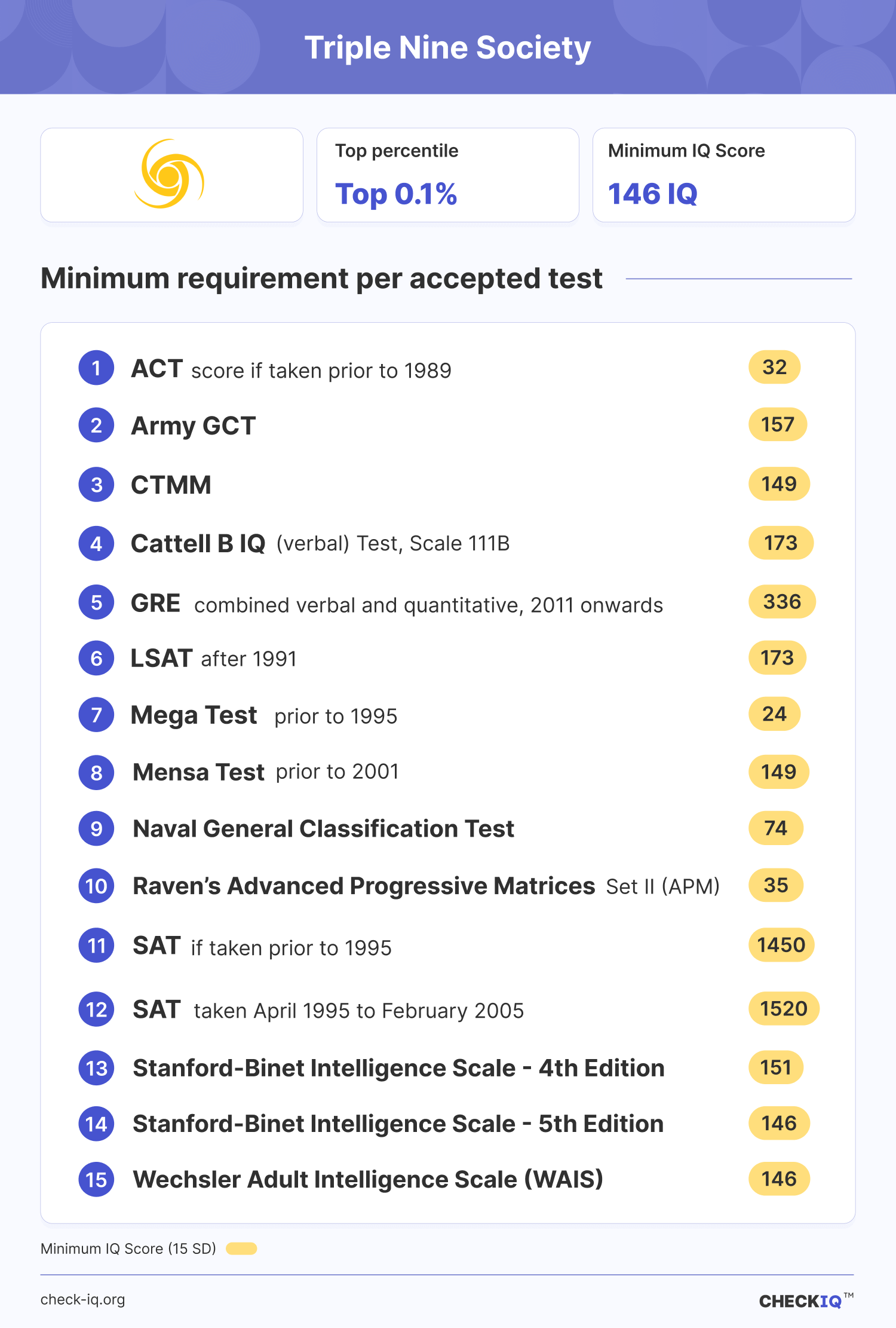
Triple Nine Society requirements
To join the Triple Nine Society, you’ll need to be among the top 0.1% of IQ test takers, with an average IQ of 146 (σ=15).
Accepted tests include ACT, Army GCT or GT, California Test of Mental Maturity (CTMM), Cattell Intelligence (verbal) Test, GRE, LSAT, Mega Test, Mensa Admission Test, Naval General Classification Test, Raven’s Advanced Progressive Matrices, SAT, Stanford-Binet Intelligence Scale, and Wechsler IQ Test.
| Test | Minimum Score |
|---|---|
| ACT score if taken prior to 1989 | 32 |
| Army GCT or GT | 157 |
| California Test of Mental Maturity (CTMM) | 149 |
| Cattell Intelligence (verbal) Test, Scale 111B | 173 |
| GRE combined verbal and quantitative, 2011 onwards | 336 |
| LSAT after 1991 | 173 |
| Mega Test prior to 1995 | 24 |
| Mensa Admission Test prior to 2001 | 149 |
| Naval General Classification Test before 1977 | 74 |
| Raven’s Advanced Progressive Matrices, Set II (APM) | 35 |
| SAT if taken prior to 1995 | 1450 |
| SAT, taken April 1995 to February 2005 | 1520 |
| Stanford-Binet Intelligence Scale, From L or M | 151 |
| Wechsler IQ Test | 146 |
International Society for Philosophical Enquiry
Overview of International Society for Philosophical Enquiry
Founded in 1974 by Christopher Harding as The Thousand, the International Society for Philosophical Enquiry (ISPE) shines as a hub for the top 0.1% of minds, marked by their performance on standardized intelligence tests such as ATGSB.
This society, one of the oldest and most esteemed in the high-IQ community, celebrates a rich diversity among its members, known as "Thousanders," who hail from various corners of the globe, embodying different beliefs, professions, and passions.
ISPE enriches its members' intellectual journey with Telicom, a detailed quarterly journal that has grown to feature 100-200 pages of member-contributed content. But it's more than just a think tank; ISPE fosters a vibrant community through private social networks, special interest groups, exclusive online gatherings, and a directory to connect members, offering a platform for both intellectual exchange and personal growth.
This blend of academic and social engagement makes ISPE a unique space for those seeking to explore philosophical questions and make meaningful contributions to society.
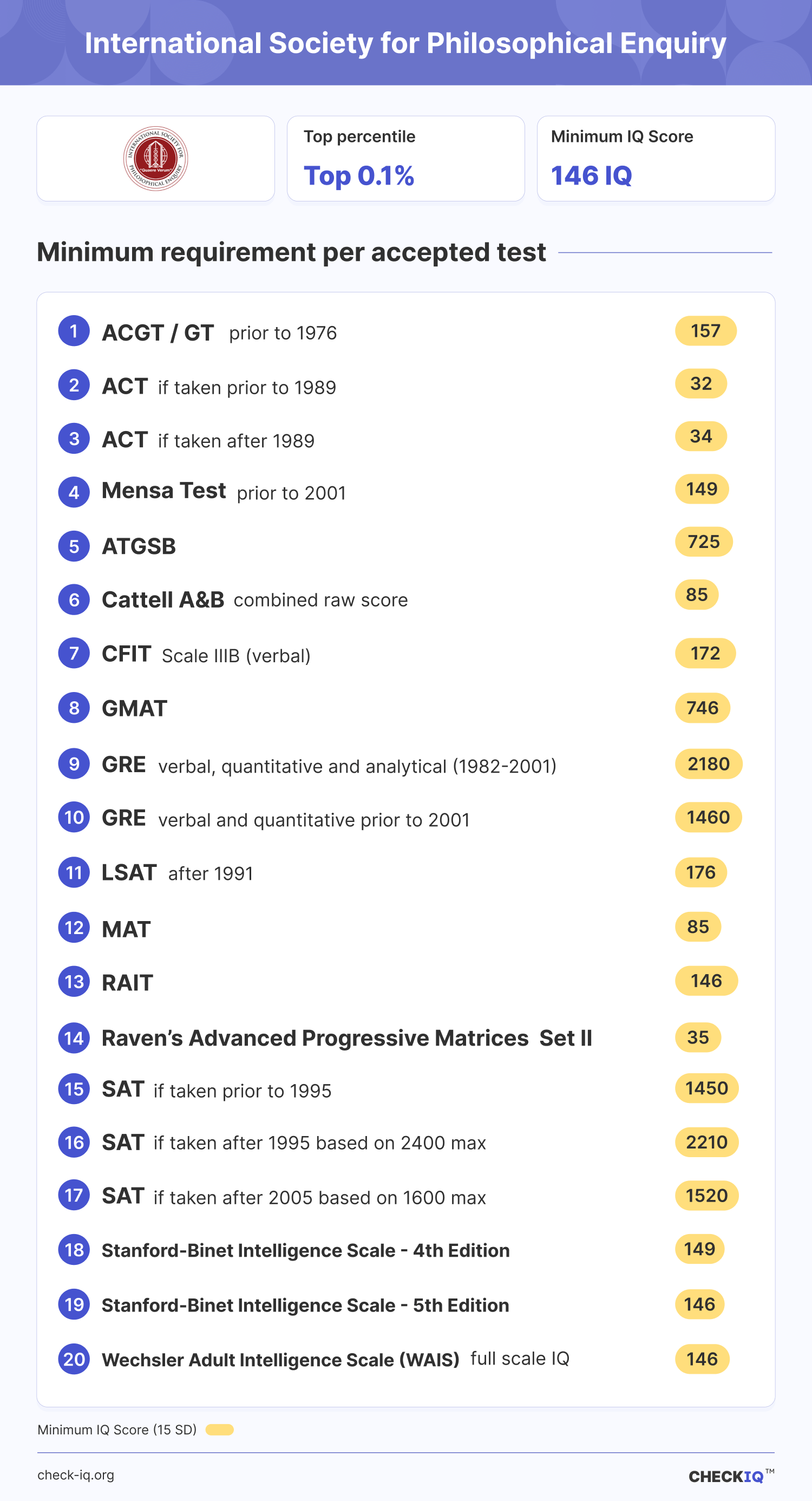
International Society for Philosophical Enquiry requirements (ISPE)
To join the International Society for Philosophical Enquiry, you’ll need to be among the top 0.1% of IQ test takers, with an average IQ of 146 (standard deviation of 15).
Accepted tests include ACGT / GT, ACT, American Mensa Admission Test, ATGSB, Cattell A&B combined raw score, Cattell Intelligence Test, GMAT, GRE, LSAT, Miller Analogies Test (MAT), RAIT (Reynolds Adaptive Intelligence test), Raven’s Advanced Progressive Matrices, SAT, Stanford-Binet Intelligence Scale, and Wechsler IQ Test (WAIS II, III, IV).
| Test | Minimum Score |
|---|---|
| ACGT / GT prior to 1976 | 157 raw |
| ACT (American College Testing) if taken prior to 1989 | 32 |
| ACT (American College Testing) if taken after 1989 | 34 |
| American Mensa Admission Test prior to 2001 | 149 |
| ATGSB (American Test for Graduate Study in Business) | 725 |
| Cattell A&B combined raw score | 85 |
| Cattell Intelligence Test, Scale IIIB (verbal) | 172 |
| GMAT (Graduate Management Admission Test) | 746 |
| GRE verbal, quantitative and analytical (1982-2001) | 2180 |
| GRE verbal and quantitative prior to 2001 | 1460 |
| LSAT after 1991 | 176 |
| Miller Analogies Test (MAT) | 472 scaled; 85 raw |
| RAIT (Reynolds Adaptive Intelligence test) | 146 |
| Raven’s Advanced Progressive Matrices, Set II | Raw score 35, scaled score 146 |
| SAT if taken prior to 1995 | 1450 |
| SAT if taken after 1995 based on 2400 max | 2210 |
| SAT if taken after 2005 based on 1600 max | 1520 |
| Stanford-Binet Intelligence Scale, Form L or M | 151 |
| Stanford-Binet Intelligence Scale, Form LM or SB-IV | 149 |
| Stanford-Binet Intelligence Scale, Form SB-IV or SB-5 | 146 |
| Wechsler IQ Test (WAIS II, III, IV) full scale IQ | 146 |
Prometheus Society
Overview of Prometheus Society
The Prometheus Society, started in 1982 by Ronald K. Hoeflin, is a special club for some of the smartest people in the world. More specifically, it's for those who score super high on IQ tests, higher than 99.997% of all people.
This means it's extremely challenging to get in, and there are less than 36 members from 13 different countries. They don't accept scores from tests made by the society's founder, though, as they believe those tests might no longer be the best way to measure how smart someone is.
Once you're in, you can talk and share ideas with other members in an online group called the Fire List.
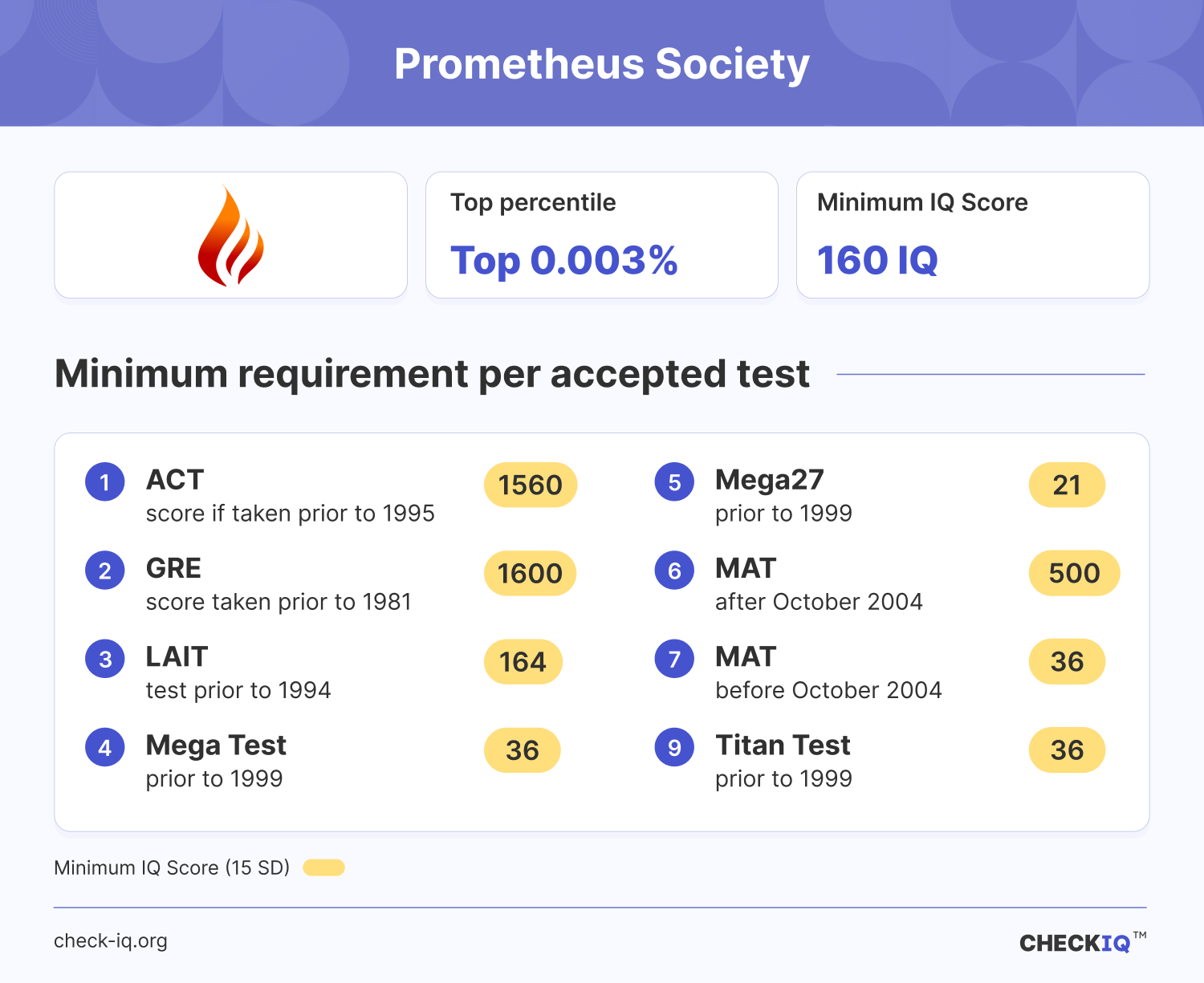
Prometheus requirements
Prometheus is looking for members in the top 0.003% scorers, with an IQ of at least 160 (σ=15).
Accepted tests include ACT, GRE, LAIT, Mega Test, Miller Analogies Test (MAT), and Titan Test.
| Test | Minimum Score |
|---|---|
| ACT score if taken prior to 1995 | 1560 |
| GRE score taken prior to 1981 | 1600 |
| LAIT test prior to 1994 | 164 |
| Mega Test prior to 1999 | 36 |
| Mega27 prior to 1999 | 21 |
| Miller Analogies Test (MAT) after October 2004 | 500 |
| Miller Analogies Test (MAT) before October 2004 | 36 |
| Titan Test prior to 1999 | 36 |
Epimetheus Society
Overview of Epimetheus Society
The Epimetheus Society is an elite club started by Ronald K. Hoeflin, Ph.D.
It's much more selective than Mensa, looking for people in the top 0.003% – this means an IQ of 160 or more. This society is all about bringing together some of the brightest minds to talk, share ideas, and learn from each other.
If you make the cut, you're in good company, with folks like the physicist Don Stoner and the society's founder, showing it's a place for smart people from all sorts of backgrounds.
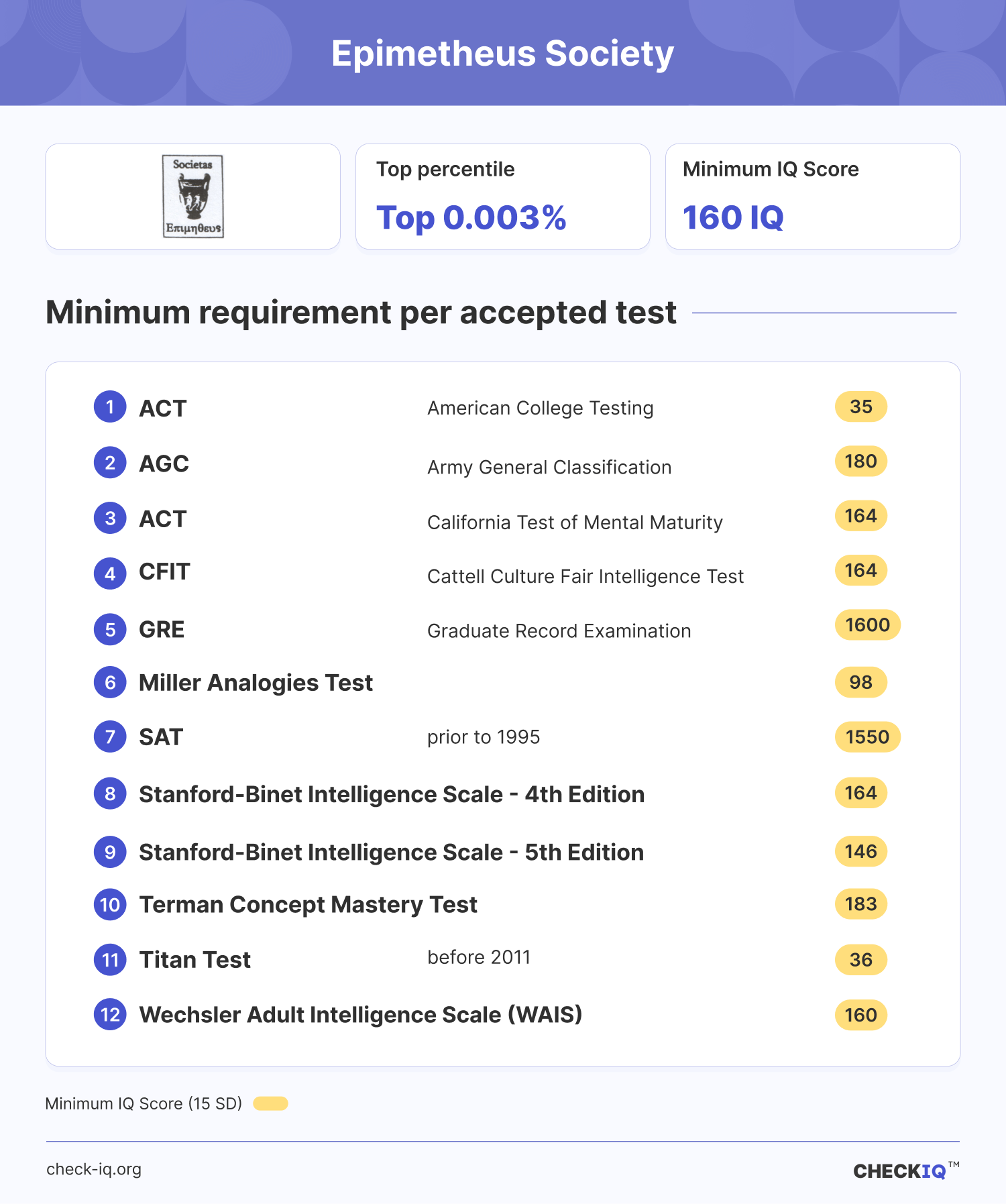
Epimetheus Society requirements
You’ll need to be among the top 0.003% of IQ test takers, with an average IQ of 160 (σ=15).
Accepted tests include ACT, Army General Classification (AGC) test, California Test of Mental Maturity, Cattell Culture Fair Intelligence Test, GRE, Miller Analogies Test, SAT, Stanford-Binet, Terman Concept Mastery Test, and Wechsler Adult Intelligence Scale IQ Test.
| Test | Minimum Score |
|---|---|
| ACT (American College Testing) | 35 |
| Army General Classification (AGC) test | 180 |
| California Test of Mental Maturity | 164 |
| Cattell Culture Fair Intelligence Test | 164 |
| GRE (Graduate Record Examination) | 1600 |
| Miller Analogies Test (old) | 98 |
| SAT (Scholastic Aptitude Test) prior to 1995 | 1550 |
| Stanford-Binet (old) | 190 |
| Stanford-Binet (new) | 160 |
| Terman Concept Mastery Test | 183 |
| Titan Test before 2011 | 36 |
| Wechsler Adult Intelligence Scale IQ Test | 160 |
Additional perks: Focuses on stimulating discussions and child participation in intellectual development.
Membership process: Submission of qualifying test scores and personal information; includes children with proper authorization.
Mega Society
Overview of Mega Society
The Mega Society, created in 1982, is a super exclusive club for the smartest people, aiming for the top 0.0001% (or 1 in a million). With an average IQ of 171.3 and only 26 members as of January 2014, it's known for being at the top of the intellectual world.
Joining isn't easy; you need to score extremely high on specific tests, and there's a $10 fee for scoring. Members get to read and contribute to Noesis, the society's journal, full of deep talks and ideas.
Founded by Dr. Ronald K. Hoeflin, the society includes some famous brains like <a href='/celebrity-iq/marilyn-vos-savant-iq'>Marilyn vos Savant</a>. It's a place for those who want to dive into high-level intellectual discussions.
Despite its prestige, the society's website seems to have been created with a preference for simple web design and storing documents in PDFs, which might not suit everyone's internet speed. They even have a constitution, adding a touch of seriousness. Yet, with all its quirks, the Mega Society remains one of the most renowned among high-IQ groups.
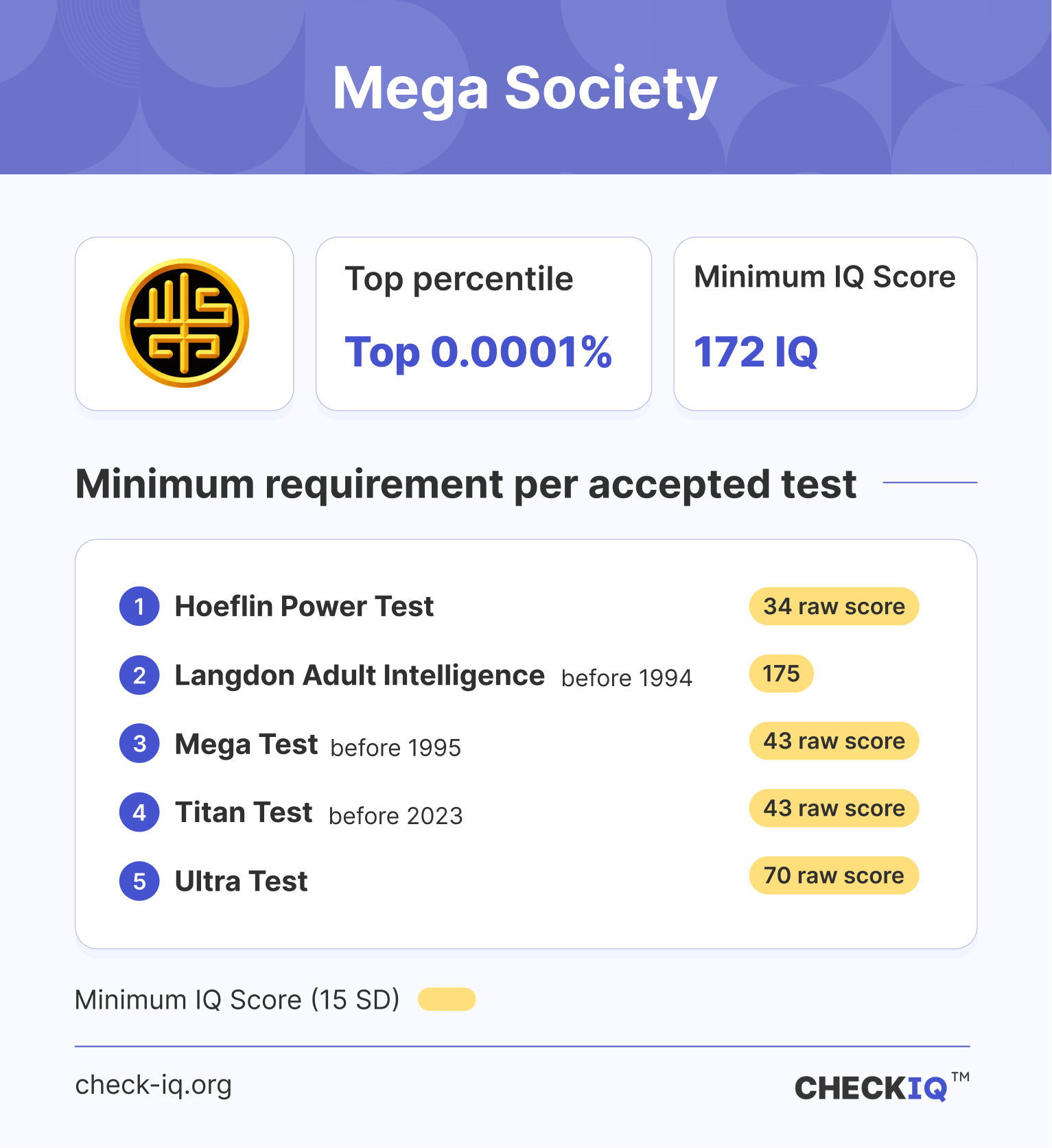
Mega Society requirements
Getting accepted into the Mega Society is definitely not a walk in the park.
To qualify, you must rank in the top 0.0001% of scorers on standardized IQ tests, which corresponds to an IQ score of 171 to 172 (σ=15). However, the society does not appear to accept scores from the more <a href='/blog/types-iq-test-adults'>commonly administered IQ tests</a>, making its entry criteria even more exclusive.
Accepted tests include Hoeflin Power Test, Langdon Adult Intelligence Test, Mega Test, Titan Test, and Ultra Test.
| Test | Minimum Score |
|---|---|
| Hoeflin Power Test | 34 raw score |
| Langdon Adult Intelligence Test before 1994 | 175 |
| Mega Test before 1995 | 43 raw score |
| Titan Test before 2020 | 43 raw score |
| Ultra Test | 70 raw score |
Giga Society
Overview of Giga Society
The GIGA Society, founded in 2001, is an ultra-niche club for the intellectually elite, requiring an IQ of 190 or higher (SD 15) for membership. This society distinguishes itself by embracing a variety of high-range IQ tests from around the world, making it uniquely inclusive among high-IQ groups.
With just ten members globally, hailing from fields like academia and technology, GIGA showcases an extraordinary level of brainpower. GIGA is dedicated to connecting these rare minds, using the most challenging IQ tests as their point of reference.
Membership is complimentary, offering a space for deep discussion and collaborative projects among its members, furthering its goal to push the boundaries of intellectual achievement.
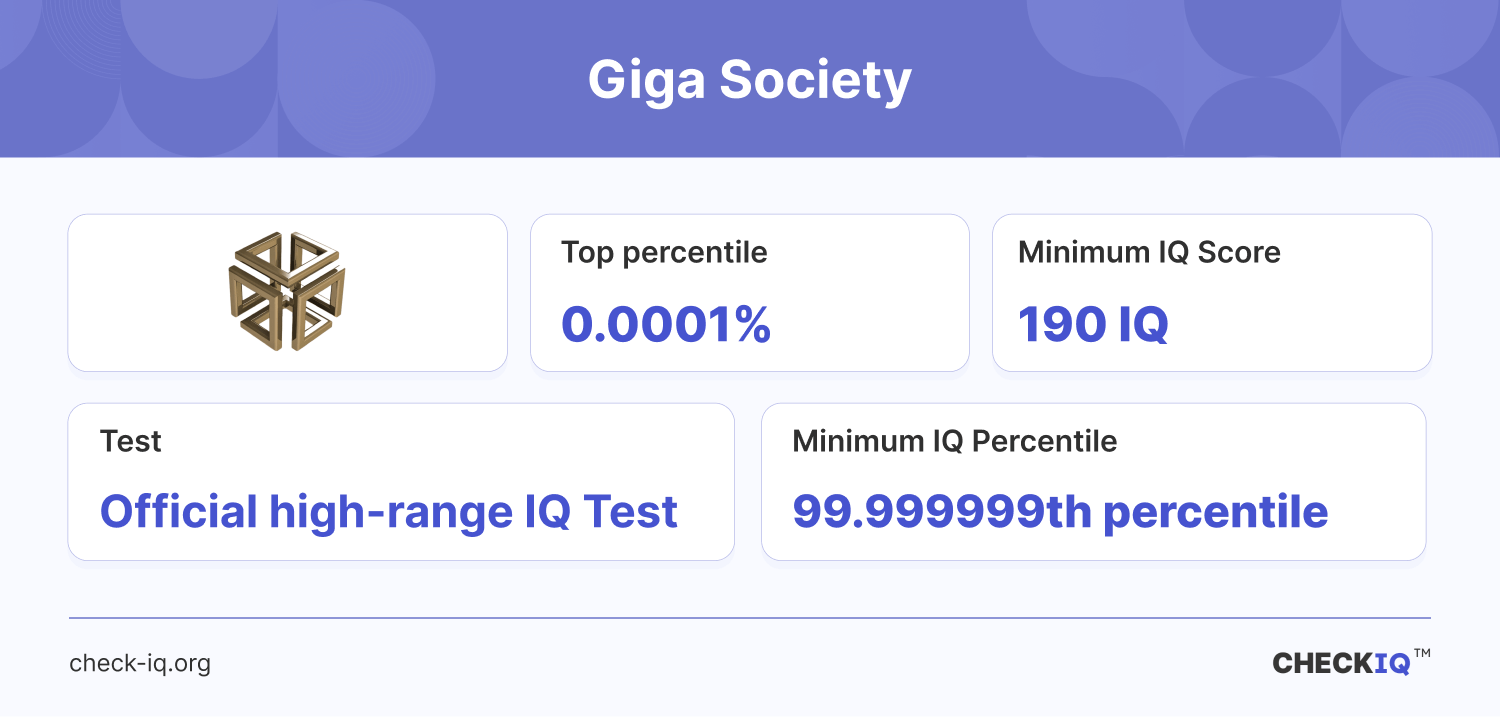
Giga Society requirements
Excluding Tera Society, which is virtually impossible to get into, the Giga Society is the most difficult high-IQ society to join. To do so, you’ll need a 190 IQ which means you are 1 in a million (99.999999999th percentile)
Accepted tests include official high-range IQ tests with a score of 190 or 99.999999th percentile.
| Test | Minimum Score |
|---|---|
| Official high-range IQ Test | 190 or 99.999999th percentile |
Getting Into a High-IQ Society
The decision to join
Joining a high-IQ society is the great way to meet people that you have something in common with. Even more, you can become part of a network that may contribute to significant changes throughout the world.
However, if you make this decision, it should be an informed one. Despite the hype around high-IQ societies, things don’t happen like you’d expect them to according to the media or movies.
In reality, joining such a group can be a great responsibility.The unique challenges of people who have IQ scores that are difficult to achieve are also something to consider - while you may find people who can empathize with you, you may also have to face such challenges during events, meetings, or projects.
What is it like to be part of a high IQ society?
All high-IQ societies connect their members through events and shared activities, but the specifics differ from one to another. Generally, workshops, dinner parties, trivia nights, and game tournaments – all are regular facets of how these societies encourage interaction and mental stimulation among their peers.
The founders of these societies, such as Roland Berrill who co-founded Mensa, envisioned them as a means to bring together individuals of high intelligence to foster communities where intellectual discourse and collaboration are celebrated.
However, each society reaches this goal in its own way. This is why, if you’re interested in joining one, it’s important to remember that they have different membership criteria and standards, and they may address audiences in distinct geographical zones.
FAQ on IQ and High-IQ Societies
Tests for IQs over 160
As you’ve probably noticed, several High-IQ societies require an IQ score over 160. Such scores are exceptional and rare, but there are tests designed for this purpose. Specialized assessments, like the Stanford-Binet 5 or the Wechsler Adult Intelligence Scale, have ceilings that can accommodate these high scores.
However, these extreme scores often bring up questions about the inherent variability and reliability of tests at such high levels, leading to the development of different tests that seek to expand the upper ends.
Can I join a high-IQ society like Mensa with an SAT score?
Yes, you can join a high-IQ Society like Mensa using your SAT score, but there are specific criteria you must meet. However, the SAT score you submit must come from a test taken before a specific date (due to changes in the test's format and scoring over time), and your score must be within the top 2% of the test-taking population.
For example, Mensa has historically accepted SAT scores from tests taken before 1994, where the required score for eligibility might be a combined score (Verbal and Math) that places the test-taker in the top 2% of those taking the SAT at that time.

